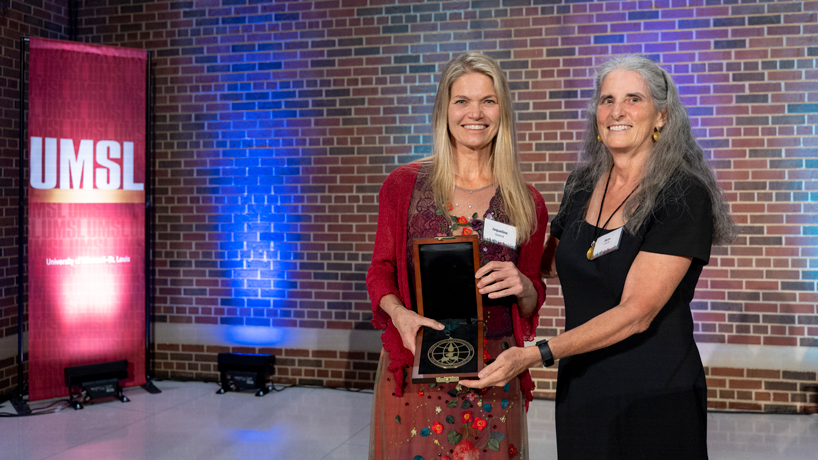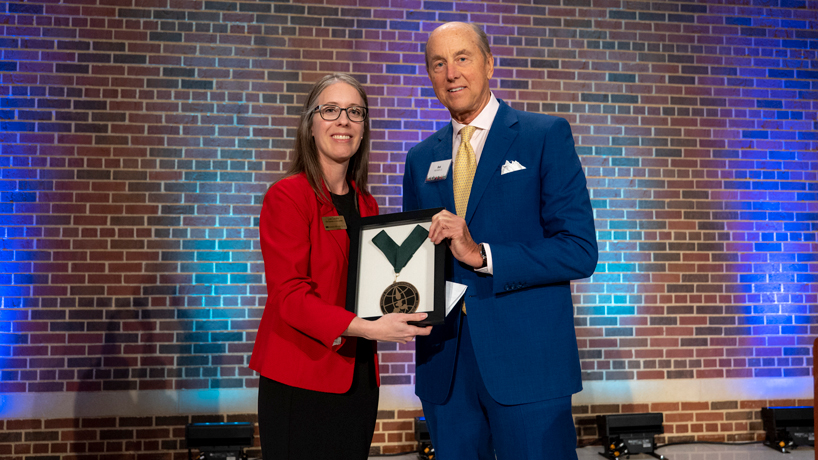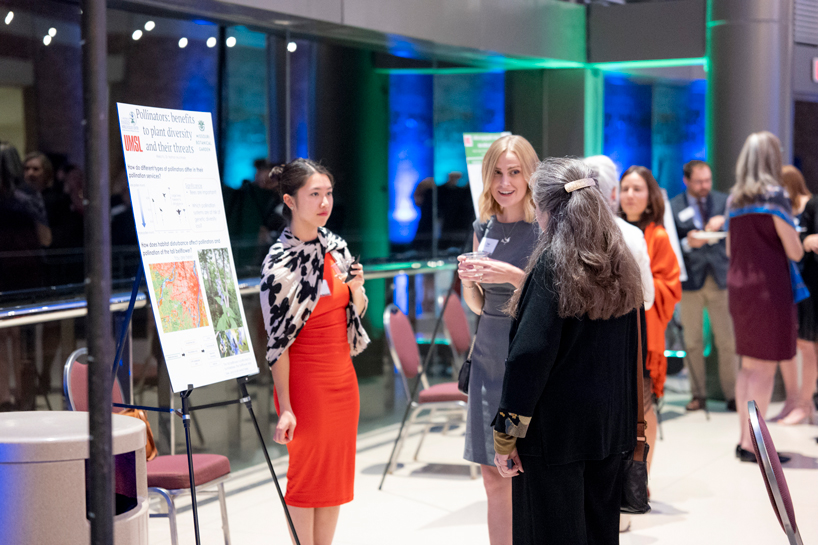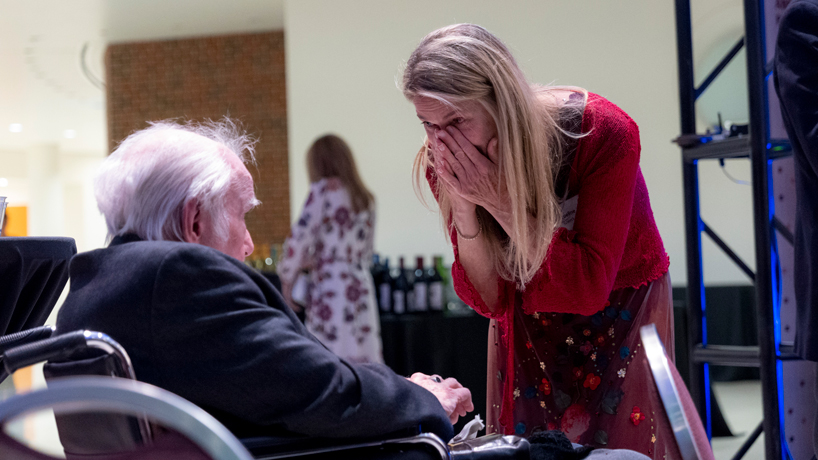
Alumna Jaqueline Goerck, who earned her PhD from UMSL in 1999, accepts the Robert R. Hermann World Ecology Award from her former doctoral advisor Bette Loiselle at the World Ecology Award Gala on Thursday night at the Blanche M. Touhill Performing Arts Center. (Photos by August Jennewein)
For more than three decades, the Whitney R. Harris World Ecology Center at the University of Missouri–St. Louis has been presenting its World Ecology Award to individuals and organizations who’ve made significant contributions to the protection of the global environment and the preservation of its biodiversity.
Many eminent scientists and philanthropists have accepted the prize – renamed earlier this year to honor Robert R. Hermann – since it was first bestowed on recording artist and activist John Denver in 1990. The list of awardees has grown to include such luminaries as Jacques Cousteau, Jane Goodall, Harrison Ford and E.O. Wilson.
This year, for the first time, the center honored one of its own when it presented the award to Jaqueline Goerck, who received support from the Harris Center when she was pursuing her PhD at UMSL in the 1990s.
UMSL Vice Chancellor for Advancement Lisa Capone presents Robert R. Hermann Jr. with a framed World Ecology Award medal to commemorate the award being named for his late father, Robert R. Hermann Sr., a noted philanthropist and longtime member of the board of the Whitney R. Harris World Ecology Center.
Goerck, a 1999 graduate, returned to her native Brazil after graduation and went on to help found the organization SAVE Brasil with a focus on the conservation of birds and their natural environments. She now serves as president of its board of directors.
“To me this was a complete surprise because so many of my heroes also hold this honor – Jacques Cousteau, Dr. Paul Ehrlich, Dr. Richard Leakey, Jane Goodall, Dr. Peter Raven and Dr. E.O. Wilson, just to name a few,” Goerck said as she accepted the award at a gala held Thursday night in the Terrace Lobby at the Blanche M. Touhill Performing Arts Center.
She said she shared the award with her colleagues at SAVE Brasil, including its longtime director Pedro Develey. Over the past 18 years, the organization has worked with local communities and researchers to connect people to nature and has played an integral role in protecting more than 150,000 hectares of forest along with more than 600 species of birds.
Goerck, who was joined by her three teenage daughters on her return to St. Louis for the awards gala, expressed gratitude to the directors and leadership council members at the Harris Center, as well as the members of the gala committee, for the recognition, and paid tribute to the education she received in the Department of Biology at UMSL.
“My work would not have been possible without the teachings I received here, especially from my advisor, Dr. Bette Loiselle,” Goerck said. “I not only received a high-quality education here, but I also learned about the collaborative spirit between the University of Missouri–St. Louis, the Whitney R. Harris World Ecology Center, the Missouri Botanical Garden and the Saint Louis Zoo.”
It was serendipitous that Goerck first met Loiselle in the early 1990s. By then, she’d graduated from the University of São Paulo with a degree in biology, and she began co-leading nature tours while trying to figure out the direction she wanted to take for a career.
Loiselle had recently accepted a faculty position at UMSL connected to the newly founded International Center for Tropical Ecology (since renamed the Whitney R. Harris World Ecology Center). She was leading a group observing natural history in Brazil when she took Goerck’s tour in Itatiaia, near Rio de Janeiro.
Current master’s and doctoral students connected to the Whitney R. Harris World Ecology Center gave poster presentations about their research at last week’s Robert R. Hermann World Ecology Award Gala in the Terrace Lobby at the Blanche M. Touhill Performing Arts Center.
“I can still remember birding with her as we were surrounded by these crazily colored tanagers that you get in Itatiaia, as well as saffron toucanets, black-and-gold cotingas, among many others in this birder’s paradise,” Loiselle said while introducing Goerck at Thursday’s gala.
The two kept in touch after their chance encounter. About a year later, Goerck reached out to Loiselle expressing an interest in pursuing graduate studies in biology at UMSL, and she got accepted to the program.
“She quickly emerged as an academic star in an already very talented group of graduate students from around the globe,” said Loiselle, now the director of the Tropical Conservation and Development Program at the University of Florida.
Goerck has fond memories of an early course she took at UMSL with noted botanist Alwyn Gentry at the Missouri Botanical Garden during her first year in the program.
That summer, she joined Gentry and a group of other researchers on a Conservation International Rapid Assessment Program mission in western Ecuador. They were on a treetop reconnaissance flight on Aug. 3 near Guayaquil when their plane crashed into a mountain ridge hidden by clouds, killing four including Gentry, American ornithologist Ted Parker and Ecuadorian ecologist Eduardo Aspiazu.
Goerck was one of three researchers who survived, and she and Ecuadorian botanist Carmen Bonifaz made their way down the rough mountain terrain through dense forest for hours, despite broken bones, and were found by local villagers, who helped them to safety.
The physical and emotional toll of that experience still weighed on Goerck as she eventually returned to St. Louis to continue her graduate studies while recovering from a serious back injury.
“It was a difficult time for me,” Goerck said. “If it weren’t for my friends, especially Betty – she was a real savior. She was very, very supportive. My friends, the faculty and staff, they always welcomed me and really supported me through that time. I think that was very important for me to be able to come back and finish my master’s and then move to my PhD.”
Goerck completed her master’s degree in 1995 and her PhD four years later, writing a dissertation on the ecology and evolution of Drymophila and Hypocnemis antbirds in the Atlantic Forest of Brazil.
Robert R. Hermann World Ecology Award recipient Jaqueline Goerck speaks to noted botanist and Missouri Botanical Garden President Emeritus Peter Raven, himself a past recipient of the award.
She had always figured earning her PhD would lead her to a position in academia or a job as a curator at a museum. But the day after she returned home to Brazil, she got a call from a contact at BirdLife International asking her to lead a study on how to begin bird conservation efforts in Brazil. At the time, BirdLife International didn’t have a partner organization in the country, and conservation efforts were few.
Goerck remembers feeling exhausted from the stresses of doctoral work and looking forward to some downtime, but she realized the opportunity was not one she could pass up.
“The environmental movement in Brazil was gaining a lot of power, and it was really very uplifting,” Goerck said. “It was an amazing time to be back in Brazil. There were all these scientists and environmentalists getting together and defining priorities for conservation. It was something that I had never seen. So I jumped right in and glued to them and we came up with a plan for BirdLife.”
After completing the study, Goerck was asked to try to implement some of the ideas she came up with.
Out of that work came the origins of SAVE Brasil, officially launched in 2004. It is now part of a network of more than 115 national non-governmental partner organizations of BirdLife International spread across six continents, and it operates with biodiversity conservation projects in nine Brazilian states.
Goerck’s early days with the organization were often spent in the field, working on projects when she wasn’t writing grant proposals to secure funding support. But her work evolved over time to become more advisory with a focus on strategic planning.
She hadn’t ever formally studied for a career as an environmental advocate, engaging with local and national organizations, government agencies, businesses, local leaders and community members. But her PhD experience has served her well navigating the unexpected path her career has followed, specifically when it comes to problem-solving and setting an end goal.
“It’s not the question that you’re answering with the PhD, but you have to finalize what you started and you have to come full way,” she said. “You have this question, you gather the data, you work on it, and then you present something. This work is not that different. You decide what you want to do. You find the ways to do it, and you try to find a solution.”
Goerck stepped back from the day-to-day operations of SAVE Brasil in 2016 but has remained involved as the president of the board of directors. She takes great pride in the organization’s work, though she never expected it would be recognized with the World Ecology Award.
“I am proud of our achievements, but the challenge is still immense,” Goerck said. “This award will certainly help our organization and show the world that it is possible to believe in a dream.”

















